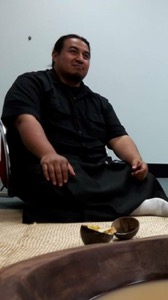Welcome to our new series, Graduate Stories, where we introduce you to some of the outstanding graduate researchers working in various anthropology departments around Aotearoa New Zealand and showcase their research.
Our first instalment features Daniel Hernandez, who is in the last year of his PhD at Te Wharewānanga o Tāmaki Makaurau (University of Auckland) under the supervision of Kirsten Zemke, Greg Booth, and Sun Hee Koo.
Daniel Hernandez
Tell us about yourself.
I’m local to the Rose Park neighbourhood in Salt Lake City (a.k.a. Kava Lake City), Utah. My ancestry is mixed, including Jewish, European, and African ancestors, but I mostly know and identify as Mayan (Iximulew/Guatemala). I descend from K’iche’, Kaqchiquel, Tz’utujil, and Mam lineages. Three years ago I came to New Zealand with my wife (a Hamiltonian) and our three children, which became four here. We currently live in Tāmaki Makaurau (Auckland).
What drew you to anthropology?
For me, there were two reasons. Initially it was out of practical necessity, as a non-traditional first generation university student I was in and out of studies over several years, and when I was finally able to set apart more time and resources to finish an undergrad degree, due to my circumstances and what I had studied so far, anthropology was the degree I could finish sooner. Secondly, I heard about anthropology by taking a paper on it out of curiosity, which peaked my interest because it was the first time in my schooling experience that I didn’t have to study only “white” people. I ended up doing a Masters, and landed in education, where I got introduced to critical theories and I haven't looked back ever since, bringing "other" thought and my brown body back into the anthropological space. I chose to return to anthropology for several reasons, but one was because of the potential to ground theory with people’s lived experiences in the ethnographic approach.
What are you working on?
My current PhD project is Rootz Vaka: The Songs of the Kava Canoe carry Tongan-ness through Time and Space. It explores urban Indigenous identities in diaspora with ethnographic research in Kava circles. I have been participating in kava for over a decade and it is a topic I am passionate about. Additionally, because I already had relationships with the communities, and considering ‘fieldwork’ limitations with family commitments, it was also a practical topic to study further. I am interested in developing Indigenous theories, decolonial politics, and epistemological concepts such as talanoa (story dialogue), the Tongan tā vā (time-space) theory, mana/tapu/noa, and I hope to also begin a conversation between them and Mayan concepts of time. Themes I am focusing on include religion, gender, diaspora, hip hop/reggae, and Indigeneity.
How have you found life as a graduate student?
A major positive about being a graduate student is that even though I’m in heaps of debt for (potentially) ever…being able to borrow money has meant that I have been able to borrow time. This is a privilege and opportunity I don’t take lightly as I reflect and think of family who grind and sacrifice so this can get done. I think of friends and fams who don’t have the same access to university resources or the privilege that comes with this dominant form of knowledge production. In saying that, it has not been easy taking this path. Personally, I feel like it is not made for a person like myself, as a family person for example, someone who has a lot of other responsibilities outside of university life. The support from individuals, like my supervisors has been great, but the institution itself, structurally is not made for me or the knowledge system I come from. Despite these challenges, I feel my presence is a necessary disruption and I’m responding to the learning curve of many things that are too late for me, but that I’ll be able to anticipate for future students I hope to work with.
What are your influences?
Growing up it was my parents knowledge of story and survival adaptability. Today, it is also my partner and her creativity and resilience. The land of my ancestors and places I’ve lived and stood in. Dreams, relationships, movies, youtube, and other media. Decolonial theory and literature on Indigenous epistemologies resonates with me and I reckon will come through in the work as well. I try to publish under my paternal and maternal grandmothers surnames to honour them, so in my writing I also go by Arcia Tecun.
Publications & films:
Tecun, A., Hafoka, ‘I., ‘Ulu‘ave, L., & ‘Ulu‘ave-Hafoka, M. (forthcoming). Talanoa: Tongan Epistemology and Research Method. AlterNative: An International Journal of Indigenous People.
Tecun, Arcia (Hernandez, Daniel). (2017). Tongan Kava: Performance, Adaptation, and Identity in Diaspora. Performance of the Real E-journal, 1 (1): 52-64. Retrieve from: http://www.otago.ac.nz/performance-of-the-real/proceedings/index.html
Rooz Vaka: Kava Canoe. 3 min documentary: https://www.youtube.com/watch?v=KA-hy2DikvE
Indigenous representation in media, colonialism, and gender. 3 min documentary responding to Disney’s Moana: https://www.youtube.com/watch?v=5KcxdsbvZhs&t=9s
A 15-min documentary with some of Maui’s descendants and friends responding to Disney’s Moana: https://www.youtube.com/watch?v=OdsRO4i7pFM&t=7s
Daniel was the recipient of the ASAA/NZ Graduate Travel Award and Kākano Fund Award in 2017 presenting at the Shifting States conference in Adelaide. He has produced a number of publications and short films around kava, talanoa, religion, indigenous identity, representation and performance. This semester, Daniel is teaching the politics of culture at Auckland University as a Professional Teaching Fellow.



